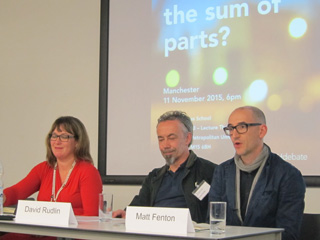Written by:
Last week we continued our Debate Series, A Place for Everyone?, with the question Place: the sum of parts? in Manchester.
Place as people
“Place is more than the sum of parts”, decried David Rudlin, Director at URBED. New places don’t have a “patina” of memory, tradition, belonging. These are the things that make up a place, as opposed to a great piece of urban design, according to David. “Build whatever you want and leave it stand for 100 years and [the place] self regenerates.” Perhaps we don’t have to wait quite that long though – as many of the stories from our audience evidenced. People’s actions, their agency, was and is everywhere, although sometimes diverted by the ‘rules’ (for more on the rules, read our round up of the Edinburgh Debate last month).
The role of design/designer
“Buildings can be catalysts for transforming culture” opened Lynda Shillaw, of the Manchester Airport Group, adding that the quality of working environments could really help organisations develop their employees and organisations.
There was a view in the room that we should be designing not for today’s uses, but for the future. But is it the role of the designer to facilitate people’s thinking about the future or to advocate on behalf of the community?

Include and exclude
“We’re not all equal in the sum of parts”, we heard from the audience. There was a sense in which we failed to recognise the diversity of individuals and the ability of places to both support and hamper people’s participation in society, community, place. Some in the audience felt that it was a “corporate mentality” that sanitised our cities and excluded many. At a time of scant resources, could we invest less in controlling and policing spaces, and more in finding places for those we exclude?
One participant told us we were stuck between territoriality and being welcoming to new people –“how stable does a place need to be before you can be welcoming? You need to feel abundant to welcome [others].”
The power of the microphone
Contact Director, Matt Fenton, shared his story of the impact of handing over control of a programme to young people. His experience of how it could transform places, projects and people inspired the room.
“Real engagement is hard, it takes love, empathy, passion and time”, said a self-declared ‘dirty developer’. Others in the audience shared their experience that many countries of the southern hemisphere were seeing a “paradigm shift” of community-led planning, leaving the UK and others lagging behind.
The room reflected on “the power of the microphone” in controlling whose voice was heard in our communities (and in our debate!). The public and voluntary sectors were accused of sometimes being “a passive force”, when there is great potential for them to be brokering forces in the tensions between the community, developer and others.
Lastly, we were challenged to democratise the placemaking process – to release and realise the connection between democracy and place. And so Manchester hands the baton to our next debate city, Nottingham, where we will ask Place: a shared responsibility? on 3 February 2016.
We invite you to continue this conversation by adding your comments below, or on Twitter using our hashtag #GHdebate. Or join one of our future debates.
